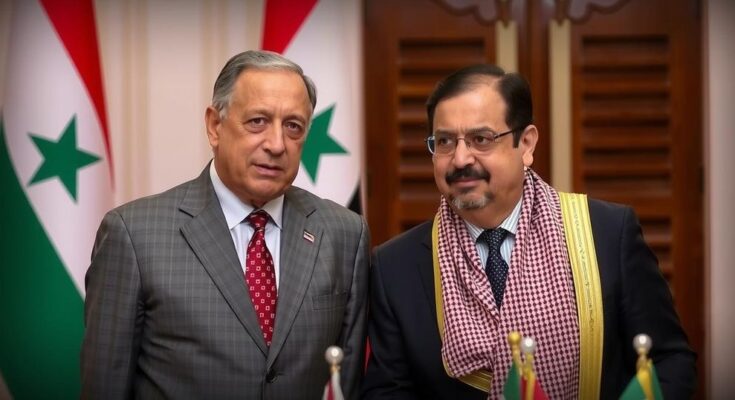Jordanian Foreign Minister Ayman Safadi met with Syria’s leader Ahmed al-Sharaa, signaling Jordan’s readiness to support Syria’s rebuilding and emphasizing the importance of regional stability. This meeting occurs amid renewed diplomatic relations, with countries like Qatar and Turkiye also engaging with Syria’s new government. Safadi highlighted security concerns along the Jordan-Syria border and condemned recent Israeli military actions.
In a recent diplomatic effort, Jordanian Foreign Minister Ayman Safadi visited Damascus and engaged in discussions with Ahmed al-Sharaa, Syria’s new leader, following the recent overthrow of President Bashar al-Assad. Safadi expressed Jordan’s willingness to support Syria’s reconstruction, emphasizing, “We stand by our Syrian brothers as they start the rebuilding process.” He underscored the importance of a secure and stable Syria, which is vital for regional security, particularly given Jordan’s 375-kilometer border with Syria. Political relations are being established with neighboring countries, as the leaders seek a unified approach to the transitional phase in Syria.
Concurrent diplomatic activities included a visit from Qatar’s Mohammed al-Khulaifi, who aims to reinforce Qatar’s commitment to aid the Syrian populace, as well as Turkiye’s Foreign Minister Hakan Fidan. The discussions highlighted the importance of ending the crippling international sanctions against Syria, an issue resonating throughout the region.
Safadi stressed that Jordan has tightened its border controls to combat drug and weapon trafficking originating from Syria, specifically mentioning Captagon. He further condemned Israel’s recent military actions, deeming them an infringement upon Syria’s sovereignty, and called for Israel’s compliance with past agreements.
With this renewed interaction, regional leaders, including diplomats from the United States, are cautiously optimistic about Syria’s political future post-Assad. Al-Sharaa’s efforts to gain recognition from Arab and Western nations signal a new phase for Syria’s foreign relations, as he seeks to stabilize and develop the nation amidst ongoing challenges and after years of turmoil.
The recent political developments in Syria follow the ousting of long-time President Bashar al-Assad, leading to a shift in governance under Ahmed al-Sharaa. As various nations reassess their diplomatic stances toward Syria, regional countries like Jordan and Qatar are eager to engage with the new administration and support the reconstruction of war-torn Syria. The situation along Jordan’s border with Syria remains a primary concern, particularly concerning security and stability amidst ongoing challenges.
In conclusion, Jordan’s diplomatic engagement with Syria marks a significant step towards regional stability and cooperation following a turbulent decade. The emphasis on rebuilding Syria and addressing security concerns reflects a common goal among neighboring states to foster a safe political environment. As Jordan and other nations navigate this transition, their collaborative efforts are essential for ensuring a peaceful and prosperous future for the Syrian people and the region at large.
Original Source: www.aljazeera.com




